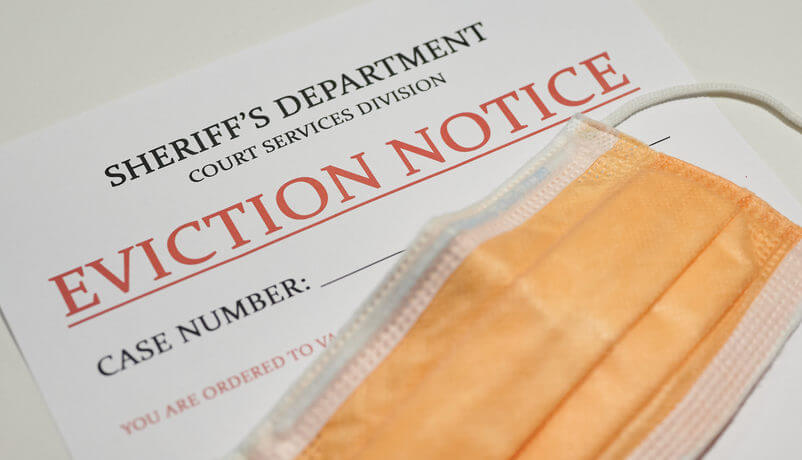
Image via Shutterstock
Including how things have (and have not) changed during COVID-19
RICHMOND-The number of looming evictions in Virginia are continuing to pile up as officials work through a backlog of cases that started amassing at the beginning of the pandemic.
As entire industries shut down to slow the spread of COVID-19 in March, Gov. Ralph Northam instructed the Virginia Supreme Court to issue a moratorium on eviction hearings that would help to keep people in their homes, even as job losses mounted. He extended the moratorium one more time, but it ultimately ended in late June. Northam allowed local courts to extend the ban as they saw fit, but many local judges declined to extend the moratorium, meaning many renters in Virginia could be subject to an eviction.
How does the eviction process work in Virginia?
Renters who do not, or can not, pay their rent can be evicted by their landlord, but you can’t just get kicked out of your home just because a landlord says so. In Virginia, there are five steps a landlord has to take before an eviction is finalized.
Renters have a five day grace period to pay their rent before the eviction process starts. The case begins with a written notice from the landlord when the tenant does not pay their rent within the grace period. The landlord has to file an eviction lawsuit with local court, which is also known as an “unlawful detainer” suit. In this step, the landlord will gather information and proof that they notified the tenant and bring it to court.
Then, if approved, the second step is a scheduled court date. The court will schedule a hearing date with information about how much time has passed since the landlord gave the tenant notice, and details on the time and place of the hearing.
The third step is the trial, which is often very brief because tenants don’t have a right to an attorney in civil matters, according to the Virginia Department of Housing and Community Development. If the judge rules in favor of the landlord, the tenant has 10 days to appeal before the decision is final.
A writ of possession is the fourth step in the eviction process. The writ of possession is a legal document that the court sends to the local sheriff’s office and allows a sheriff or deputy to force a tenant out. According to the VDHCD, the writ of possession can be served anytime within 30 days.
The fifth step in the process has to do with a tenant’s possessions. When a landlord gives a tenant a notice of eviction, they need to include a statement about the tenant’s possessions. If property is left behind after the eviction it will be considered abandoned after 24 hours. If the landlord skips this step they are required to wait 10 days before they are allowed to remove property from inside the residence.
The pandemic has changed things though, how is the process different now?
Before the moratorium on evictions expired, it basically put a stop to the eviction process in the courts temporarily. For a while, at least, tenants didn’t have to worry about being evicted or the next steps in their existing eviction case.
Although evictions were allowed to move forward in Virginia courts in late June, Northam implemented a $50 million rent and mortgage relief program for the commonwealth. The funding, which comes from the CARES Act, is designed to help with housing stability in Virginia by providing financial assistance for rent and mortgage payments. The program provides assistance for payments that were past due beginning on April 1 onward. It provides a one-time payment and an opportunity for renewal based on a household’s eligibility and need.
Eligible renters are also able to delay their eviction for 60 days. To do so, renters must show up at their first court date, provide proof that they lost income between March 12 and the court date and ask the judge for a 60 day continuance.
There is also an option provided by the federal government to halt all evictions against tenants who can’t pay their rent on properties that have federally-backed loans or already participate in other programs. The moratorium lasts until July 25. ProPublica has a database that allows renters to search for their apartment buildings nationwide to see if their unit qualifies for this protection.
Despite the rent and mortgage assistance program, many advocates in Virginia are saying it’s not enough. Virginia courts are working through a backlog of more than 12,000 eviction cases, according to Northam’s office, and many residents are still struggling with unemployment.
If you are struggling with rent click here. You can also call the Eviction Legal Helpline at (833-NoEvict).
Politics

He said what? 10 things to know about RFK Jr.
The Kennedy family has long been considered “Democratic royalty.” But Robert F. Kennedy, Jr.—son of Robert F. Kennedy, who was assassinated while...

Opinion: The problem with Youngkin’s Charter-Lab schools push in 2024
The Problem Governor Glenn Youngkin introduced 233 amendments to the bipartisan budget so it was hard to know how to assess his budget–for example,...
Local News

Virginia verses: Celebrating 5 poetic icons for National Poetry Month
There’s no shortage of great writers when it comes to our commonwealth. From the haunting verses of Edgar Allan Poe, who found solace in Richmond's...

Join the fun: Recapping Family Literacy Night’s storybook adventures
When’s the last time you read a book aloud with a loved one? If it’s difficult to answer that question, then maybe it’s time to dust off that TBR...




